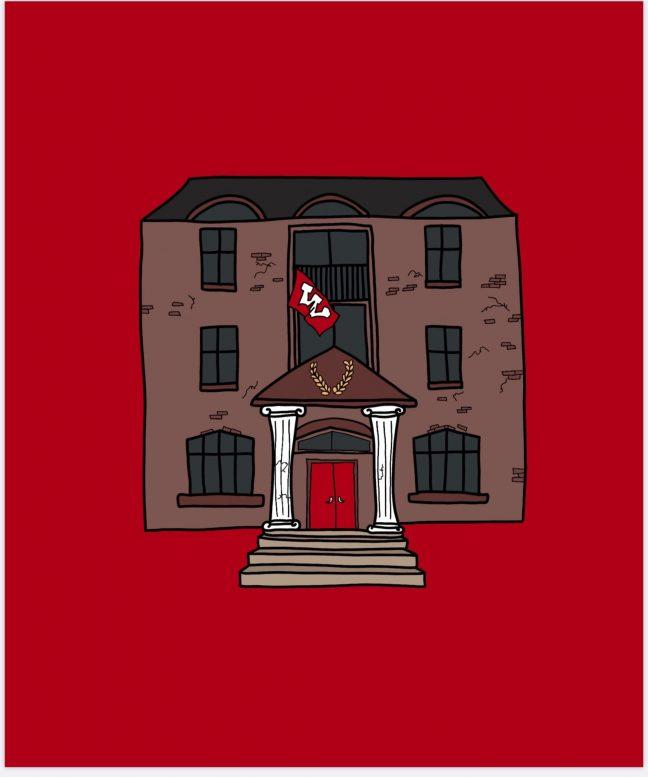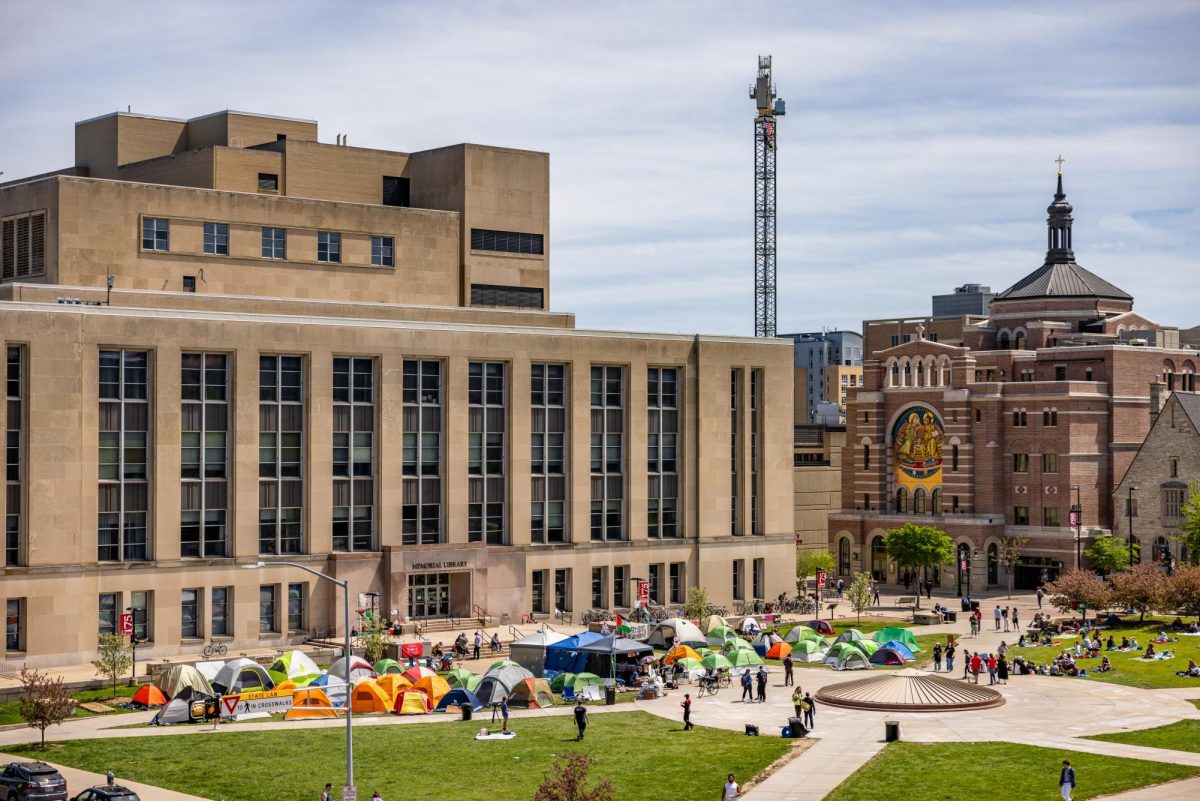When the external review team of the University of Wisconsin fraternities and sororities released their report following their spring 2019 interviews, meetings and investigations into the community’s culture, the group found a particularly curious cause for the cracked foundations many UW Greek organizations rest on.
“Among many student affairs staff members there exists a sense that the fraternity/sorority students ‘belong’ to [Fraternity and Sorority Life] alone,” the report reads. “One staff member problematically referred to them as ‘their [FSL] students’ — specifically implying they were not hers.”
Crooked on the Northeast corner of the UW’s campus, Langdon Street sometimes appears to be a natural artery from the figurative heart of campus, Memorial Union. In recent history, though, a discrepancy in the perception between what is and is not considered a part of campus when it comes to Greek Life has risen to the forefront and created a sometimes divisive relationship between the university and Greek organizations.
As Associate Vice Chancellor for Student Affairs Mark Guthier sees it, the tension that rises in this relationship isn’t exactly hidden.
“We are focused on deepening both the university’s, and [the Greek] community’s commitment to building and sustaining a healthier relationship,” Guthier said. “I think it’s well-known there have been challenges in this area.”
For current UW undergraduates, it’s not surprising to see the university acknowledge this disconnect between itself and organizations in the Interfraternity Council, Panhellenic Association, Multicultural Greek Council and National Pan-Hellenic Council. In the Big Ten Conference, known for relatively active Greek Life communities in addition to academic and athletic excellence, UW’s community seems thin.
According to US News and World Report, only 8% of students participate in Greek Life at UW — UW officially reports 14% of students are involved in Greek organizations — a statistic which ranks dead last out of all reported Big Ten figures. For many UW students, it is possible to have an undergraduate experience completely devoid of the Greek community.
Seemingly annual reports relating increased health and safety risks to members of Greek organizations, coupled with these comparatively low involvement numbers, further spells trouble for UW’s Greek community. Released in February 2019, “The Color of Drinking” report found fraternity and sorority houses and Langdon Street in general as the two most-reported drinking sites for UW students — by over 20% more than the next-highest reported site.
At present, five fraternities have been fully terminated in relationship to UW, with two more either suspended or on probation. Negative perceptions of Greek life continue to creep into student conversations on Madison streets and online.
The disconnect in the relationship between Langdon’s houses and the university-at-large can seem like a byproduct of the modern era. Increased attention to sexual assault and drinking risks in studies like “The Color of Drinking” and the AAU Campus Climate Survey appear to put more and more heat on these long-standing UW communities.
With all the headlines, however, comes a history.
Autonomy from National, campus
One of the first issues of autonomy Greek organizations faced on UW’s campus put more than a decade’s worth of UW students in a contentious fight supporting discrimination clauses. Until 1961, various Greek organizations on UW’s campus restricted membership based on racial, ethnic or religious grounds. These clauses included Sigma Chi’s restriction of membership to only “bona-fide white” males.
While the timeline seems quite delayed for eliminating these clearly discriminatory provisions, UW was one of the first universities nationwide to be entirely rid of the clauses in all of its organizations. Yet the Human Rights Committee, which was primarily composed of faculty, ultimately pushed these clauses to extinction rather than intent of the organizations themselves.
For example, then-President of UW Sigma Chi Richard Urfer drafted a report calling for the elimination of a strict 1960 deadline to remove clauses like those found in the chapter’s constitution. A few months later, he went with other members of the chapter to fight for the removal of said clauses. This report, like many other pieces of evidence from this tension, can be found in the UW Archives in Steenbock Library.
Once removed, additional worries of true autonomy bubbled to the surface. A nearby case, where the national organization of Delta Gamma suspended its Beloit College chapter after it tried to pledge an African-American student, made the faculty Human Rights Committee question whether UW organizations could actually pledge members of color. Due to these fears, the Board of Regents recommended to terminate the Delta Gamma chapter at UW shortly thereafter.
In an oral history conducted in 1975, former dean of students Leroy E. Luberg said over 1,000 members of the local chapters marched to his office in Bascom Hall to say that they “were free, they were open, they were nondiscriminatory, and we at the University should be strong enough and broadminded enough to allow them to continue.”
The chapter was allowed to stay on campus, but the tone had shifted. The minutes of a following IFC meeting noted the community’s want for “faculty help, not faculty dictation” in confronting these issues facing the chapters. The archives themselves also support signs of a rift at this particular moment in the community’s history, as the university only holds records of meeting minutes until early 1964.
In the following decades, newsmaking incidents repeatedly suggested a disconnect between the university and the Greek community. In the late 1980s, a series of racially-charged events, including a Zeta Beta Tau “slave auction” conspicuously parodying famous African-American personalities and a “Harlem” room at a party featuring watermelon jugs, brought questions of the relationship between the Greek community and the university as a whole back into focus.
In Zeta Beta Tau’s case, for example, a student-led committee determined no action could be taken against the fraternity’s “slave auction,” given the display lied within the scope of the first amendment. But the Wisconsin Student Association, a previous iteration of student government, proclaimed Zeta Beta Tau “had no place on campus.”
With this backdrop, then-Chancellor Donna Shalala created The Commission on the Future of Fraternities and Sororities to examine the community and its relationship to the university as a whole.
School of Journalism and Mass Communication Professor Emeritus James Hoyt led the commission comprised of faculty, staff, alumni and students, making the commission widely called the “Hoyt Commission.” Hoyt said in a feature in the 1993 edition of the Badger Yearbook that the Greek community at the time was very unorganized and lacked oversight from the broader university.
“We discovered the IFC was a very ineffective, rag-tag organization,” Hoyt said. “No one knew if they had a constitution.”
Following this commission, the IFC and other Greek governing bodies became restrengthened as the commission effectively let the Greek communities govern themselves. Then-IFC President Dennis Lesak said in the same feature this was “different from other campuses,” where the university has more direct involvement in the governance of its Greek organizations.
Concerns throughout campus
Once again, UW turns its eye eastward to Langdon Street with the UW Fraternity and Sorority Life External Review. With this past as prologue, the reasoning for the wide-ranging external review becomes clearer. One can begin to understand why the second article of the IFC’s bylaws denote the organization as “self-governing,” and pushed away from strict university dictation.
Early last spring, the vice chancellor charged the group with the purpose of “assessing, clarifying, and strengthening the relationship between the University of Wisconsin–Madison and the fraternity and sorority community.” As the review worked on identifying the tensions in this relationship, familiar issues yet again rose to the surface.
In the August 2019 report, the external review team described an issue of autonomy in decision-making between the Committee on Student Organizations, the Office of Student Conduct and the councils, which they termed as a “jurisdictional challenge.”
Created in 1996, after the events and determinations of the Hoyt Commission, the Committee on Student Organization’s purposes are to keep registered student organizations in compliance with established policies and discipline organizations if these policies are broken.
While proximal in development of the Hoyt Commission, the creation of this committee was a departure from the self-governance solution. This committee, along with the chapter judicial boards, national headquarters and the Governing Council, leaves all Greek organizations under four layers of jurisdiction, each with their own requirements.
Noted in the external review’s report, concerns about the sense of a judicial bureaucracy with these competing jurisdictional bodies made several IFC openly contemplate the possibilities of a Greek community adjacent yet dissociated from campus.
These dreams of a completely autonomous, “underground” system seems like a typical want for UW’s Greek communities when put in historical context, but most Greek-affiliated students never learn of this history.
Tim Nielsen, junior member of Delta Tau Delta, had never heard of this community history before.
“At least in my experience, history of Greek life as a whole at this university is not really focused on,” Nielsen said. “The history of specific chapters at the university and nationally is, but as far as the community as a whole and its history, I don’t think there’s any formal education.”
Of course, this want for autonomy was not the only aspect of the historical UW Greek experience reiterated in the external review. Students of color interviewed for the review, both involved in Greek organizations and unaffiliated, routinely described Langdon Street as a place where they did not feel safe.
Additionally, members of MGC and NPHC organizations felt marginalized as their organizations never received praise for the good they were doing in the community, and yet all Greeks were scolded whenever any chapter engaged in detrimental behaviors.
These findings led the team to recommend the university “place singular focus and attention on UW’s history, structures, policy and practices and how they lead to or inhibit the recruitment, retention, and belonging of students, faculty, and staff of color.”
When the vice chancellor released the action plan in August, Greek leaders said they were optimistic for progress in a UW news article.
Gloria Wide, president of the MGC, felt this indicated a university commitment towards the entire Greek community and allows for members in the community to share their voices to evoke change in their communities.
“I’m optimistic because there are so many of us dedicated to working on the system — to do better and to be better,” Wide said.
Communities in collaboration
These action plans are just getting started. Two new work groups inspired by the external review team’s suggestions have come to fruition since the report’s release last August.
The Langdon Street Community Coalition, consisting of fraternity and sorority members, advisors and other stakeholders involved with student organizations, is focused on addressing broad concerns which have in the past added tension in the community’s relationship to the university, including group climate and risk reduction.
Another work group includes student members from the MGC and NPHC and is focused on drafting tangible action plans to address the five priority areas in the institution’s response to the report.
“Since the fraternity and sorority life review was completed in August, we’ve had seven listening sessions with several constituent groups, including the Langdon Area Community Coalition and the four councils that govern the nearly 60 chapters in this community,” Guthier said. “The response was very positive, and the sessions allowed us to get important feedback and agreements on our priority areas.”
These key priorities neglect to specifically include community-wide education on the history of UW’s Greek organizations, leaving the question of whether the community can broadly learn from its past tensions up in the air.
With many forces joining together this time, there is hope a collaborative can change the community’s narrative going forward.
“I think it’s important to emphasize that we are doing this work in community,” Guthier said. “It has been a very collaborative process among students in fraternity and sorority life, the governing councils [IFC, PHA, NPHC and MGC], alumni, house corps members, advisors, university staff and Madison community members. Each of the priority areas are connected, so this work isn’t being done in silos.”
Guthier added that progress from these newly-formed groups should become available throughout the current semester.
In the Greek community, these new groups do not come tarnished with a history of disagreements and tension, leaving an open relationship possible in their coming actions.
“[The work groups are] relatively new, they haven’t really done things that I necessarily disagree with or completely agree with,” Nielsen said, “but I’m aware of their existence. They just haven’t really done much yet.”
With work to be done, these plans have a chance to make the bonds between fraternity and sorority life and UW just as strong as the bonds between brothers and sisters.















